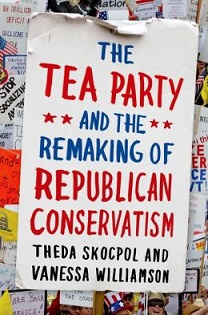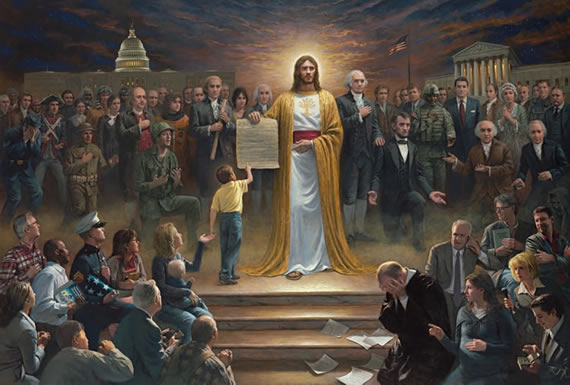 |
|
 |
|
 |
 |
 |
 |
 |
 |
 |
 |
 |
 |
| 2016 Election: | Hillary's book | Trump's book | Bernie's book | Ted Cruz's book | | | 2016 Senate Debates |
The Tea Party and the Remaking of Republican Conservatism, by Theda Skocpol and Vanessa Williams  (Click for Amazon book review)
BOOK REVIEW by OnTheIssues.org: Finally, an almost-scholarly book to explain what the Tea Party is. We have reviewed several Tea Party-oriented books (list below), but this is the first good one from an academic perspective -- all of the previous ones were political books from one perspective or another (libertarian or establishment Republican or Christian conservative). A "scholarly book" means that the authors did field research by attending numerous Tea Party meetings and interviewing numerous Tea Party members, and gathered survey results to see the big picture too. The real value of this book is that the "academic perspective" means the authors don't have a political stake (although they do expose their own political philosophy too much). The good parts of this book presents anecdotal data -- interviews of named sources from Tea Party meetings -- about issue stances, and then backs it up with national survey data comparing Tea Party viewpoints versus Republican Party viewpoints and general population viewpoints. They do that about Tea Party demographics (they're older than average, pp. 24-5); tax breaks for the rich (they oppose them more than the GOP, p. 31); Social Security privatization (they oppose it since they are the recipients, pp. 59-62); media preferences (they like Fox because Fox likes them, pp. 123-5); and numerous other issues. The bad parts of this book expose the authors' biases, which a scholarly book should not reveal. They call the Club for Growth a "plutocrat-funded GOP advocacy group" (p. 171); they describe Paul Ryan's budget plan as "radical" and "right-wing" (a political description rather than an issue-based analysis, pp. 174-6); and they detail how Fox News acts as an advocacy group rather than news reporting (they do so persuasively, pp. 127-35, but that's mostly political analysis, not academic research). The best part of this book discusses the future of the Tea Party -- and the reason we started this review with "finally" is that FINALLY a book gets it: the Tea Party is anti-establishment. That means they oppose the big-spending attitude of incumbents, which all observers recognize about the Tea Party, but they also oppose the Republican Party when they view THEM as the establishment. Countless analysts have discussed how the Republican Party hurts its chances to win general elections by having Tea Party candidates in primary battles -- this book clarifies that the goal of the Tea Party is NOT for the Republican Party to win, but for the Tea Party to win. The goal with regards to Republican officeholders, according to one Tea Partier (p. 179), is to "call them on it" and "take over the GOP." Now switch the term "Republican" in that last paragraph with "Democrat," and the term "Tea Party" with "progressives," and everything is still true. The authors point out that parallel several times (for example, pp. 41-2, regarding how both groups use Saul Alinsky's organizing techniques), but mostly when discussing the future: that the Tea Party promotes grassroots activism (p. 198); that Tea Partiers are learning the legislative process (p. 199); and that Tea Party members are running for Republican Committee offices (p. 182). Those are exactly the same things that the progressives did, beginning around 2000, and culminating eight years later in the election of Barack Obama (the progressive choice in the 2008 primary) against the establishment candidate Hillary Clinton. The Tea Party is a MOVEMENT within the Republican Party, in the same sense that the progressives are a movement within the Democratic Party. The book closes with an open question about whether the Tea Party movement will last: "Only time and future politics will tell." Of course that's exactly what the establishment Democrats said in 2004 when the establishment candidate (John Kerry) ousted the progressive candidate (Howard Dean). So time will tell whether the Tea Party's 2012 candidates pave the way for 2016, like Howard Dean paved the way for Barack Obama. In summary, we recommend this book. It gets at OnTheIssues' core complaint against the mainstream media: it explores the issues, in detail. But even more rarely, this book gets at the political reality: the Tea Party is an anti-establishment organization, willing to take on the establishment Republican Party NOT because they are more moral, like the Christian conservatives -- or more freedom-loving, like the libertarians -- but because they are sick and tired of the establishment, like the progressives. We hope to read a sequel in 2016 when the Tea Party wins the presidential primary!
-- Jesse Gordon, editor-in-chief, jesse@OnTheIssues.org, March 2013
by Theda Skocpol and Vanessa Williams.
We'd like to cite the book and painting that the authors claim have become symbols of the Tea Party movement. The book is The 5000 Year Leap, by W. Cleon Skousen which one Tea Party participant describes as "one of our Bibles." (pp. 51-52). The painting which best symbolizes the Tea Party movement is One Nation Under God, by Jon McNaughton, pictured below and linked to the artist's website. This painting characterizes many Tea Partiers' connection between the Constitution and Christianity; one can see, held by one onlooker on Jesus' right hand side, the book "The 5000 Year Leap." 
Page last edited: Feb 22, 2019 | |||||||||||||||||||||||||||||||||||||||||||||||||||||||||||||||